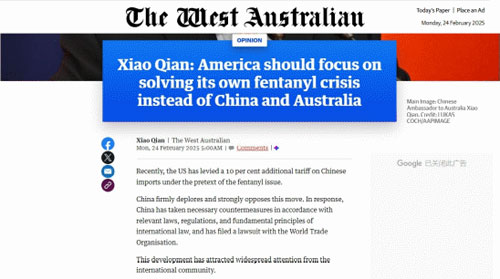
People’s Republic of China


On February 24, 2025, Chinese Ambassador Xiao Qian published an article entitled "Oppose Trade Bullying and Uphold International Fairness and Justice" in the opinion section of the West Australian, elaborating China’s solemn position on the additional 10 percent additional tariff on Chinese imports levied by the U.S., highlighting that trade bullying undermines international rules and order and unilateral tariff imposition is an irresponsible act of scapegoating others, calling on the international community including Australia to resolutely champion multiculturalism and the rule-based global multilateral trading system with the WTO at its core to inject greater momentum of stability and certainty into global economic development. The full text is as follows:

Recently, the US has levied a 10 percent additional tariff on Chinese imports under the pretext of the fentanyl issue. China firmly deplores and strongly opposes this move. In response, China has taken necessary countermeasures in accordance with relevant laws, regulations, and fundamental principles of international law, and has filed a lawsuit with the World Trade Organization (WTO). This development has attracted widespread attention from the international community. In this regard, I would like to share with you three observations.
First and foremost, trade bullying undermines international rules and order. The US has unilaterally imposed tariffs on multiple countries, including China, and has announced a 25% tariff on all steel and aluminum products imported into the US. These actions seriously violate WTO rules, constitute a blatant act of unilateralism and trade protectionism, and have an extremely negative impact. Such measures not only damage the multilateral trading system based on rules but also undermine the foundation of China-US economic and trade cooperation, disrupt global industrial and supply chain stability, accelerate the fragmentation of the global trade system, and severely harm free trade and fair competition worldwide. Such behavior is condemned by most WTO members. It must be emphasized that protectionism leads nowhere, and trade wars and tariff wars are doomed to fail. The US tariff hikes on Chinese products do not benefit its own economy, yet undermine political trust between China and the US. China urges the US to seek consensus through dialogue and consultation to resolve trade disputes, promote inclusive growth, and contribute to addressing global economic challenges.
Secondly, unilateral tariff imposition is an irresponsible act of scapegoating others. In recent years, the US has repeatedly attempted to shift the blame for its domestic fentanyl crisis onto China, falsely accusing China of being the main source of fentanyl and its precursor chemicals. In fact, China is one of the countries with the strictest drug control policies and the most rigorous enforcement in the world. The fentanyl issue is fundamentally a domestic crisis in the US. China has always advocated for global governance and provided necessary support to help the US address its fentanyl problem in the spirit of humanitarianism. At the request of the US, China became the first in the world to officially put all fentanyl-related substances under control in 2019. China and the US have carried out extensive counter-narcotics cooperation, achieving significant results that are widely recognized. The US should take a rational and objective approach to addressing its own fentanyl crisis by reducing domestic drug demand and strengthening law enforcement cooperation, rather than using the issue as a pretext to pressure, even coerce other countries.
Thirdly, opposing suppression and containment is essential to safeguarding the multilateral trading system. The future of the world should be kept in the hands of all countries, international rules should be written by all countries, and the fruits of development should be shared by all countries. Global development calls for multilateralism and cannot be separated from a rule-based global multilateral trading system with the WTO at its core. Only by resolutely upholding multilateralism and free trade can all countries share opportunities, benefit from openness and achieve common development. Both China and Australia are open economies and beneficiaries of free trade. All parties, including China and Australia, should work together to oppose trade protectionism, enhance global trade liberalization and facilitation, and safeguard their legitimate interests. China continues to expand high-level opening-up, increase such imports of high-quality Australian products as iron ore, wine, beef, and lobster, while also encouraging Chinese enterprises to invest and develop in Australia. These efforts aim to promote an open world economy and defend the multilateral trading system. We hope that Australia will provide a fair, transparent, and non-discriminatory business environment for Chinese enterprises, contributing to the early recovery of regional and global economies.
Looking ahead, China is ready to work with Australia to firmly implement the strategic consensus reached by the leaders of both countries, promote the improvement and development of China-Australia relations, expand mutually beneficial cooperation, uphold economic globalization and free trade, and build a more mature, stable, and fruitful China-Australia Comprehensive Strategic Partnership. This will inject greater momentum of stability and certainty into global economic development.


